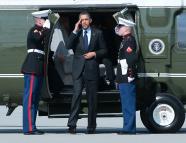2011 | Another Meds Yeghern |The White House
Office of the Press Secretary
For Immediate Release April 24, 2010
Statement of President Barack Obama on Armenian Remembrance Day

On this solemn day of remembrance, we pause to recall that ninety-five years ago one of the worst atrocities of the 20th century began. In that dark moment of history, 1.5 million Armenians were massacred or marched to their death in the final days of the Ottoman Empire.
Today is a day to reflect upon and draw lessons from these terrible events. I have consistently stated my own view of what occurred in 1915, and my view of that history has not changed. It is in all of our interest to see the achievement of a full, frank and just acknowledgment of the facts. The Meds Yeghern is a devastating chapter in the history of the Armenian people, and we must keep its memory alive in honor of those who were murdered and so that we do not repeat the grave mistakes of the past. I salute the Turks who saved Armenians in 1915 and am encouraged by the dialogue among Turks and Armenians, and within Turkey itself, regarding this painful history. Together, the Turkish and Armenian people will be stronger as they acknowledge their common history and recognize their common humanity.
Even as we confront the inhumanity of 1915, we also are inspired by the remarkable spirit of the Armenian people. While nothing can bring back those who were killed in the Meds Yeghern, the contributions that Armenians have made around the world over the last ninety-five years stand as a testament to the strength, tenacity and courage of the Armenian people. The indomitable spirit of the Armenian people is a lasting triumph over those who set out to destroy them. Many Armenians came to the United States as survivors of the horrors of 1915. Over the generations Americans of Armenian descent have richened our communities, spurred our economy, and strengthened our democracy. The strong traditions and culture of Armenians also became the foundation of a new republic which has become a part of the community of nations, partnering with the world community to build a better future.
Today, we pause with them and with Armenians everywhere to remember the awful events of 1915 with deep admiration for their contributions which transcend this dark past and give us hope for the future.









